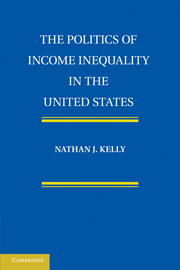Book contents
- Frontmatter
- Contents
- List of Figures
- List of Tables
- Acknowledgments
- 1 Explaining Income Inequality
- 2 The Distributional Force of Government
- 3 Political Conflict over “Who Gets What?”
- 4 Party Dynamics and Income Inequality
- 5 Macro Policy and Distributional Processes
- 6 Putting the Pieces Together: Who Gets What and How
- 7 Distribution, Redistribution, and the Future of American Politics
- Appendix A Congressional Questionnaire
- Appendix B Measuring Income Inequality over Time
- Bibliography
- Index
5 - Macro Policy and Distributional Processes
Published online by Cambridge University Press: 24 October 2009
- Frontmatter
- Contents
- List of Figures
- List of Tables
- Acknowledgments
- 1 Explaining Income Inequality
- 2 The Distributional Force of Government
- 3 Political Conflict over “Who Gets What?”
- 4 Party Dynamics and Income Inequality
- 5 Macro Policy and Distributional Processes
- 6 Putting the Pieces Together: Who Gets What and How
- 7 Distribution, Redistribution, and the Future of American Politics
- Appendix A Congressional Questionnaire
- Appendix B Measuring Income Inequality over Time
- Bibliography
- Index
Summary
The theoretical focus of the previous chapter was on power resources. There we saw that the fundamental predictions of power resources theory for distributional outcomes are borne out in the United States. Market and political power resources, as traditionally measured, have an impact on income inequality. Labor union strength influences income inequality measured prior to government redistribution. Left party control produces lower levels of inequality through both market conditioning and explicit redistribution. In this chapter, I shift the emphasis from power resources theory, an idea originating in the comparative study of welfare states, to the macro politics model, which has its roots in studies of American politics.
As discussed in Chapter 1, the macro politics model examines relationships between parts of the U.S. governing system, such as public opinion, presidential approval, partisanship, elections, and public policy at the aggregate level. The argument is that the parts of the system behave predictably and orderly. Citizens express preferences about competing policy alternatives, the preferred alternatives are enacted, and citizens then judge the quality of the outcomes produced. Tests of this model show that liberal shifts in public opinion produce liberal shifts in policy because policymakers respond to changes in public opinion and, if they do not, they are replaced through popular elections.
Aggregate public opinion influences the course of public policy in the United States, and this previous finding is an important underpinning of my work.
- Type
- Chapter
- Information
- The Politics of Income Inequality in the United States , pp. 118 - 135Publisher: Cambridge University PressPrint publication year: 2009



